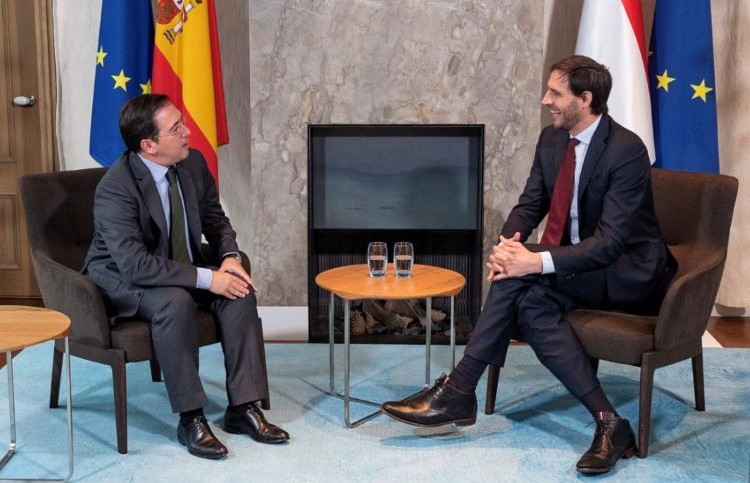Eduardo González
The Minister of Foreign Affairs, José Manuel Albares, and his counterpart of the Netherlands, Wopke Hoekstra, held yesterday a bilateral meeting in The Hague in which both signed a memorandum of understanding (MoU) for the realization of periodic political consultations that allow “structuring the bilateral dialogue beyond people or colors”.
This was announced yesterday by the minister in statements to the press after his meeting with Hoekstra, which included the participation of both in a conference organized by the think tanks Elcano Royal Institute and Clingendael Inst. “It is clear that our bilateral relations have recently regained a strength that they had not had for a long time, and that strength is marked by a harmony in terms of the analysis of the situation that Europe is going through, some values that we share and also some solutions that we propose, even sometimes through the Spanish-Dutch non-papers that have been put on the table,” said Albares.
For this reason, Albares continued, “we have signed an agreement on periodic bilateral political consultations” that will allow “structuring the dialogue”, so that “they are not simply meetings between prime ministers or meetings between foreign ministers, but that there will also be permanent political consultations at all levels of the Administration”.
As for bilateral relations, in which “there are no major differences at the moment”, Albares put “the emphasis on maintaining the dialogue on temporary workers, the 5,000 Spaniards who are in that situation“. “The response has been very good and we have agreed to continue promoting the dialogue that the Ministers of Labor are already maintaining to channel the situation,” he said.
The two ministers also discussed the situation in Europe and the war in Ukraine and the objectives of the upcoming Spanish Presidency of the EU. Apart from this, he indicated, without further details, “we have talked about interconnections, renewable energies, the Iberian mechanism and the need for Europe to never again find itself in this situation of gas and energy dependence and blackmail”. “We have also talked about the look that Europe must have towards the world and that this strategic autonomy, which the Spanish-Dutch non-paper is already talking about, should be an open strategic autonomy and look at those regions with which we can work”, he added.
Spain and the Netherlands have maintained important differences and great coincidences in the face of the great European challenges that have arisen in recent years. In the chapter of coincidences, the President of the Government, Pedro Sánchez, and the Dutch Prime Minister, Mark Rutte, presented in March 2021 a proposal for European technological and healthcare strategic autonomy, “without isolationism or protectionism”. The two governments also agreed last April to propose reforms to European fiscal rules in order to make fiscal consolidation compatible with economic growth and increased investment.
On the other hand, both governments have maintained and continue to maintain radically opposed positions on other matters of European interest, such as the negotiations on the European recovery fund following COVID-19 and the Spanish proposals to reduce energy prices. Precisely, the European Council has been debating since yesterday in Brussels the adoption of measures to curb the rise in energy prices, caused, among other factors, by the war in Ukraine. In the debate, Spain clings to the defense of the so-called “Iberian mechanism” of price control agreed at the March summit, while Germany and the Netherlands oppose any ceiling on the price of gas purchases. Faced with the possibility that the meeting may be extended due to the lack of unanimity on energy issues, Sanchez said yesterday that he would be “delighted to have breakfast” with Rutte if this would allow an agreement to be reached.







